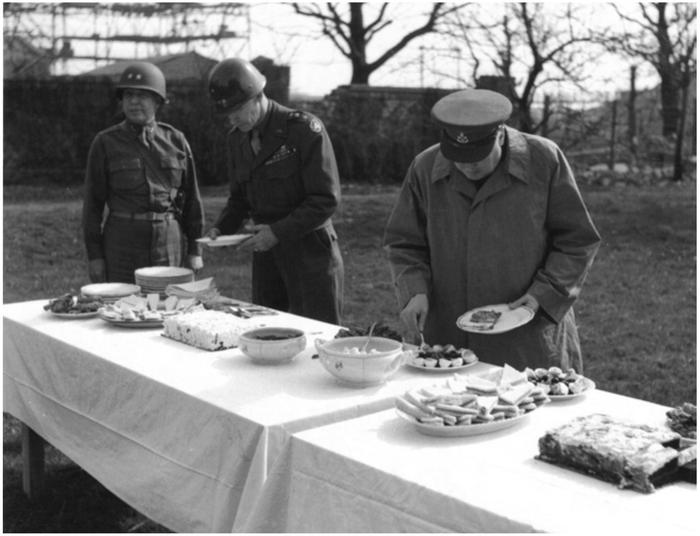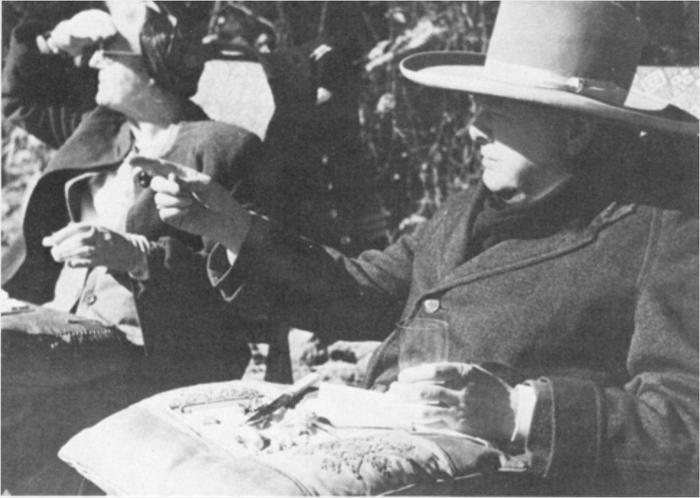Read Dinner With Churchill: Policy-Making at the Dinner Table Online
Authors: Cita Stelzer
Tags: #General, #Biography & Autobiography, #Military, #History, #World War II, #20th Century, #Europe, #World, #International Relations, #Historical, #Political Science, #Great Britain, #Modern, #Cooking, #Entertaining
Dinner With Churchill: Policy-Making at the Dinner Table (5 page)


Best to look over the bills
The missing port is explained:
Martinez Port was as usual charged for by the bottle out of which five glasses were consumed. The remainder, that is to say more than half the bottle, is being kept at the bar for Mr. Churchill’s use next time we are honoured with his
patronage
.
48
The letter then specifies that:
Two Half Cider Cups were ordered and served. As to the Whiskey, when the bottle was returned to the bar it was found that nine measures had been consumed. The 7/6d Liqueurs is for the Brandy which Mr. A. Eden had.
49
Note that at these functions the whisky bottles were left on the table for guests to serve themselves.
Churchill’s fondness for combining dining and
business
extended to picnics. Some of the picnics he organised during the Second World War were hastily convened
conferences
with his field commanders to discuss tactics and
strategy
– one in the sands at Tripoli in 1943 and another one “somewhere in north-west Europe”. Concerned as always for the morale of his troops as well as the British public, Churchill had tea with Royal Air Force pilots and with army gunners.
At another picnic, during a campaign tour, he was
accompanied
by his daughter, Sarah. Still others, later in life, were jolly affairs including large numbers of friends and associates.
Churchill had his own idiosyncratic picnic customs: some snippets of verse were to be recited only at picnics, and there was singing while “drinking old Indian Army toasts” at the end of every picnic.
53

Churchill and British generals, Alan Brooke, Montgomery and Ismay, plus Randolph, picnic in the desert, Tripoli, 1943

Churchill and American generals Eisenhower and Patton, picnic lunch in northwestern Europe

Tea with RAF pilots, September 1941

Picnic on the hustings, Churchill’s daughter, Sarah, pouring tea, June 1945
Lady Diana Cooper, in her memoirs, described a 1944 picnic with Churchill in the North African desert in some detail “… we laid out our delicatessen, the cocktail was shaken up, rugs and cushions distributed, tables and buffets appeared as by a genie’s order … he is immediately seated on a comfortable chair … a pillow put on his lap to act as a table, book-rest etc. A rather alarming succession of whiskies and brandies go down, with every time a facetious preliminary joke with Edward, an American
ex-barman
.”
50

Picnic at Marrakesh 1944
Her husband, Duff Cooper, summarises the seven picnics in a two-week stay in Marrakesh as comprising “large amounts of food and drink”. It seemed to him “a curious form of entertainment”.
51
As late as 1948, when Churchill was 74, one of his secretaries reports that at a picnic in Morocco the fare included “a whacking great slab of ice (to keep the white wine cool), a box of cold luncheon … consisting of
poached eggs and ham in aspic jelly (2), two slices of cold beef, half a cold chicken, potato salad, bread, butter, 2 apricot or strawberry tarts, cheese, orange, tangerine and lots of wine and brandy”.
52
A reasonable repast after a hard morning at the easel.
No matter the circumstances – whether in the dining room at Chartwell or on a picnic chair in the desert – Churchill’s profound belief in the importance of face-to-face
meetings
, and his unshakeable confidence in his ability to get his own way in such intimate encounters, never wavered. It is summed up in a telegraph to Roosevelt, sent shortly before he headed to Moscow in October 1944: “I feel certain that personal contact is essential.”
54
Churchill thought such personal contact, preferably at dinner, important not only with allies, but also with
enemies
. He planned to bring the Greek Civil War to an end by inviting the Communist Greeks to the negotiating table with the Greek Archbishop, Damaskinos, in Athens at Christmas 1944. There Churchill reversed his earlier vow not to shake hands with the three ELAS representatives, and afterwards told Lord Moran that he “felt that if the three Communists could be got to dine with us all difficulties would vanish”.
55
On board HMS
Ajax
, off the coast of Athens, where Churchill, Eden and others were staying (for their own protection) during the Christmas 1944 meetings, a temporary valet, who usually cared for Commanders-
in-Chief
, was assigned to Churchill. He complained to his
Admiral that Churchill “breakfasts at nine-thirty in the morning off a wing of chicken and a bottle of white wine … ”
56
Perhaps an accurate report, perhaps not.
Churchill could not always convert his dominance of the dinner table into dominance of events. Conversational skills and conviviality were no match for facts on the ground, as he was well aware, or for the need of other leaders to pursue the interests of their own nations, as they perceived them.
Three of Churchill’s diplomatic defeats – the losses that most affected the shape of the post-war world – came at
dinner
tables at Yalta (1945), Bermuda (1953) and in
Washington
(1954), the latter when he was 80. On each of these
occasions
, an American president failed to succumb to Churchill’s immense personal charm and intellect.
At Yalta, Roosevelt used the Big Three dinners to make it clear to Stalin that Churchill was no longer to be regarded as consequential a player as he had been and they now were. In Bermuda in 1953 and again in Washington in 1954, when he once again lived at the White House, Churchill was
unable
to persuade President Eisenhower, or his Secretary of State, John Foster Dulles, to agree to a summit meeting with the Soviets. This was particularly galling, since Eisenhower arguably owed his career and the wartime reputation that eventually landed him in the White House to Churchill, who had even amended the US edition of his history of the Second World War to delete anything unfavourable to Eisenhower. Churchill, fearful of the consequences of a continuation of the Cold War, was convinced that the Anglo-American Allies should meet with the new Soviet leaders to try to end or ease the tensions before they led to a nuclear war.
Despite the opportunity presented by dinners in balmy Bermuda, and a three-night stay in his familiar haunt, the White House, Churchill was defeated in his quest for
trilateral
talks by the intransigence of John Foster Dulles and Eisenhower’s view that “under this dress” – the dress of post-Stalin Russia – the Soviet Union was “still the same old girl” – a “woman of the streets”.
57
Of little use to the
outraged
Churchill was Eisenhower’s assessment of the wartime leader’s place in history: “He comes closest to fulfilling the requirement of greatness of any individual that I have met in my lifetime.”
58
The defeat at Bermuda must be viewed in the light of John Foster Dulles’ implacable opposition to any negotiations with the Soviet Union and in the context of what Churchill’s special brand of personal, dinner-table diplomacy had
accomplished
in the past. One of the leading military
historians
of our time, Eliot Cohen, puts it best:
Churchill’s conduct of the diplomacy of war reveals an extraordinary blend of techniques and approaches … The cohesiveness of the Grand Alliance stands out as a
remarkable
feat. Churchill’s personal control of those relations – through extensive correspondence and frequent overseas trips for private meetings and the large conferences that dominated the strategy of war – accounts for much of the success.
59
Churchill, a star player on the world’s stage for more than 50 years, looking back on his time spent at dinner tables, could be confident that those meals involved a lot more than excellent food, good champagne and robust cigars. One achievement – if one were needed – the establishment
of the special relationship with Roosevelt that was so crucial to defeating Nazi Germany, clearly outweighs any subsequent setbacks.
